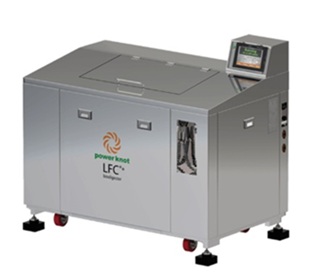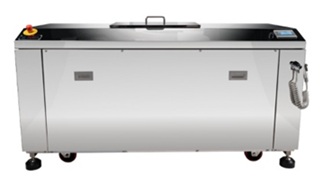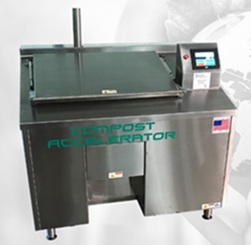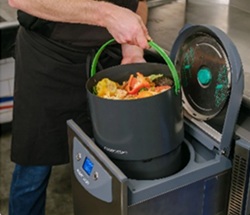
NATIONAL REPORT—There are many ways to reduce food waste to landfill. Proper portioning, smart ordering, partnering with local farmers, and food donation programs come to mind. One easy way to break down and eliminate food waste on-site is by using a biodigester. This machine, available in various sizes, biologically digests organic material. Microbes, enzymes and other bacteria break down the waste. Most food, including fat, greases, and even animal manure, can be processed in a biodigester.
Byproducts include carbon dioxide and water, which can simply be discharged into a municipal sewer system, or a soil amendment which can be used in landscaping. Biodigesters also produce heat, which helps to maintain the temperature inside the digester at an optimal level for microorganism growth and activity.
Biodigesters are a closed system; therefore, they give off no odor from food waste; this eliminates flies and rodents from the facility, increasing hygiene.
Eliminating food waste on-site saves money by reducing hauling costs. Biodigesters also reduce the number of injuries from carrying trash outdoors.
More Than 10 Supplier Options
Approximately 20 years ago, there were just a handful of companies selling biodigesters for hospitality. Today, there are at least 10 suppliers that offer biodigesters in different sizes. Green Lodging News recently took a look at the offerings of each supplier.
Power Knot has nine different LFC biodigester machines with varying capacities—from up to 165 pounds per day to up to 13,200 pounds. The machines efficiently break down organic waste into water, reducing the volume that would otherwise end up in landfills. Power Knot makes it easy to report CO2 equivalent diverted from landfill via the LFC Cloud. One can access data analytics remotely, see service schedules including when consumable items need replenishing, review diagnostics, errors, and critical operational conditions, and view history log of LFC biodigester operations.

Also using the LFC Cloud, one can identify the quantity and times when waste is generated, create reports to share with stakeholders, optimize the use of the LFC biodigester to minimize the use of utilities, e-mail alerts so you don’t need to periodically log into the LFC Cloud, use NFC cards to track types and amounts of waste, and aggregate data for multiple machines into a single report.
According to Power Knot, which includes numerous case studies on its website, the payback period on its systems is typically under two years.
Syker Systems’ Nimbus & Stratus
Syker Systems offers two biodigester models—the Nimbus with a capacity of up to 1,320 pounds in 24 hours, and the Stratus which can handle up to 880 pounds of food waste in 24 hours. Syker Systems says its machines, in most cases, pay for themselves
in 18 months. Click here to access Syker Systems case studies.
Food Cycle Science offers The FoodCycler. It reduces food waste volume by up to 90 percent and turns it into nutrient-rich “Foodilizer” within six hours. For small-scale composting, Food Cycle Science offers the Compact Commercial + which handles up to 20 gallons per day. The Industrial + can process up to 80 gallons per day. A Cloud-based dashboard provides real-time tracking of waste diversion, GHG reductions, and system performance.
The Food Waste Dehydrator from Foodservice Sustainability Solutions reduces food waste volume by up to 90 percent in as little as eight hours. The end result is a nitrogen rich soil amendment. It can also be used in animal feed. The Food Waste Steward converts 200 pounds of food waste into 20 to 60 pounds of soil amendment. Four additional sizes—up to 1,100 pounds per cycle—are available. Upon request, the company can produce a Food Waste Dehydrator that handles up to 2,000 pounds per cycle.

Provectus Enterprising Inc.’s ZED Machine is a food waste dehydrator that efficiently converts organic waste into water and sterile biomass. After treatment, the water can be reused for irrigation, toilet flushing, and other uses. See case studies here.
Recoup Technologies, Inc. offers BioHiTech biodigesters that process food waste into a grey water that safely discharges to the sanitary sewer line. Six sizes are available—from the Revolution Seed which can process up to 500 pounds per day, to the Revolution Sequoia which can process up to 2,400 pounds of food waste daily. With the company’s Cloud platform, food disposal can be monitored daily, weekly or monthly. One can access detailed diversion data to create reports to share for regulatory and corporate compliance. One can better forecast accurate supply chain and inventory needs and one can monitor all digesters from a mobile device or computer.
Systemwide Diversion Metrics
BioGreen360’s BG3 allows one to transform up to 600 pounds of food waste per day into high-quality, all-natural compost and fertilizer products. Coming soon is the BG7 which can digest up to 4,000 pounds per day. BioGreen360’s interactive, cloud-based system provides clients with systemwide diversion metrics and ensures optimal operational efficiency through a comprehensive preventive maintenance program. BioGreen360 can report usage and diversion metrics and use KPI’s to understand where and how food waste is being created.
Somat Waste Reduction Technology. Somat, a member of ITW Food Equipment Group, offers the DH-100 which requires no fresh water connection. Paddles macerate the waste, heated by the unit’s storage chamber to kill bacteria, reducing the waste volume by up to 93 percent. The resulting product is a dry, earthy material that may be used as an accelerant in a composting process. Capacity is 50 pounds to 220 pounds per batch.

Food Waste Inc. offers 11 different sizes of food waste drying machines—from 110 pounds per day to 4,400. No additives or water are required. Units can be equipped with a touch screen that allows the user to have all the pertinent data at their fingertips—data such as cycle time, temperature, error reporting, and drying sensitivity. Food waste and volume is reduced by up to 90 percent in eight to 11 hours.
ORCA Digesters, Inc.’s on-site ORCA aerobic digester utilizes a natural biological process to efficiently break down food waste prior to it being discharged into the normal plumbing infrastructure. ORCA automatically measures and records the amount of food waste digested to facilitate waste reduction in pursuit of less food waste. The one-step solution creates no solid byproduct, eliminating the need for additional handling, expensive hauling and saving the carbon emissions generated by heavy and inefficient garbage trucks. All ORCAs come equipped with on-board scales that automatically measure the weight of food waste digested. The information is subsequently showcased on the ORCA+ dashboard, offering real-time access to historical and current trends of food waste diversion. ORCA Digesters offers five sizes of biodigesters—from 15 pounds per hour to almost 100 pounds per hour.
No Water or Enzymes Required
OnSite Waste Solutions can customize, manufacture, and install dehydrators to process from 200 to more than 2,000 pounds daily. The machines do not require additional water, enzymes or wood chips to reduce the food waste.

Using ExBio aerobic food digesters, food waste is completely decomposed by Bio Star, an agent developed by ExBio, as well as microorganisms that turn food waste into water and carbon dioxide, both of which go down the drain and into the sewers. The EX Digester Series includes machines that can digest from 22 pounds to 22,000 pounds per day.
Without a biodigester, when organic waste is sent to landfills, it is buried, where it decomposes anaerobically, meaning in the absence of oxygen. This process produces methane, which is a greenhouse gas 21 times more damaging to the environment than carbon dioxide. According to the EPA, landfills are the third largest human-related source of methane in the United States, accounting for 18 percent of all methane emissions. Landfills are also known for their other negative environmental impacts, including groundwater pollution, odor problems, and immense land use.
When comparing biodigesters, be sure to ask about lease or other financial options that include servicing of the machine.
Has your property benefited from the use of a biodigester? I would love to hear from you. I can be reached at greenlodgingnews@gmail.com.





